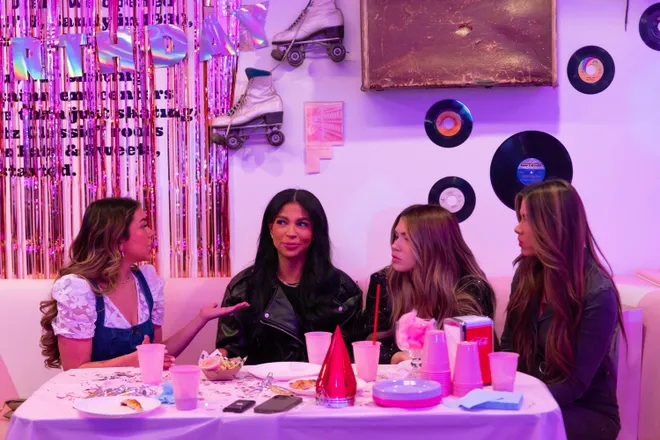These modern day Mormons are getting real about sex. But can they conquer reality TV?
A swinging scandal. An arrest. A pregnancy. A birth.
And that's just one woman's journey in the "The Secret Lives of Mormon Wives" (now streaming on Hulu), a new eight-episode reality series that somehow combines all the elements of "Gossip Girl," "The Real Housewives of Salt Lake City" and "Mean Girls" into one convoluted cocktail. In other words, I binged it all in under 24 hours. Perfect, no notes, etc.
The series centers around eight influencers behind Mormon "#MomTok" – Taylor Frankie Paul, Demi Engemann, Jennifer Affleck, Jessi Ngatikaura, Layla Taylor, Mayci Neeley, Mikayla Matthews and Whitney Leavitt. Many of these women are the breadwinners of their families because of their TikTok success. Taylor, however, thrust the group into the spotlight with a sex scandal after she admitted in a video that she partakes in "soft-swinging" – limited sexual contact – with other couples.
But "Mormon Wives" isn't really about swinging at all. It's about friendship, faith, backstabbing, gaslighting, infidelity and vacation – a typical season of "Real Housewives."
Perhaps that's why the show works so well. It's not reinventing the reality-TV wheel. It's just styling it with a different (very bingeable) bow, and offering a cautionary tale for viewers.
Need a break? Play the USA TODAY Daily Crossword Puzzle.

In case you have questions anyway:They had a loving marriage and their sex life was great. Here's why they started swinging.
How 'Mormon Wives' fight back against the patriarchy
The Church of Jesus Christ of Latter-day Saints has often been featured on TV and elsewhere in pop culture, from "My Husband's Not Gay" to "Big Love" to "Real Housewives." But this show aims to tread new ground by giving Mormon women in their 20s and 30s a chance to have an unapologetic voice about sex without staying submissive to their husbands and boyfriends.

"Mormon Wives" emphasizes how the women push back against the patriarchy. They're comfortable talking about sex, vaginas and orgasms. They aren't ashamed to discuss divorce; one woman even throws a divorce party for herself. They're open about plastic surgeries, Botox and ketamine therapy. And they get serious about physical and emotional abuse.
Still, there's plenty of infighting about, well, everything you'd expect on a reality show. Some of it is silly; "sinners" and "saints" cliques pop up as some women's religious vows run deeper than others, and after someone leaves the group chat, every time the text thread is referenced, dramatic choral music plays. But some of it is dark. You watch misogyny in action when one woman who acts a certain way in front of her friends morphs into a hollow version of herself in front of her husband. It's sometimes stomach-churning.
It's moments like these when "Mormon Wives" makes a strong case for its existence. A group of real Mormon women confronting their friend about how her husband is treating her is not something you could've watched on TV 10 years ago. Amid all the juicy reality TV drama, this kernel of truth pops and sticks the landing: When the men get most out of control, their domineering, damaging behavior is plain to the women and everyone watching at home.
Makes you think:We tune into reality TV to see well, reality. But do the stars owe us every detail?
The truth about 'guilty pleasure' TV
It makes sense, then, that the church pushed back against "entertainment media" in a recent news release. "We understand the fascination some in the media have with the Church, but regret that portrayals often rely on sensationalism and inaccuracies that do not fairly and fully reflect the lives of our Church members or the sacred beliefs that they hold dear," the church said.

No series could ever hope to accurately portray a given group. But "Mormon Wives" reveals there's more to this group of women than meets the eye. There's nothing wrong with going to church and being a mother, just as there's nothing wrong with sharing details about sex and going to church and being a mother.
I'm not sure exactly how the public will receive the show. Christians might push back against what these women say; others might embrace it and say "thank you." Some won't even bother clicking over to Hulu to watch it based on the description alone. Some will likely write it off as another "guilty pleasure" show they put on in the background while making dinner.

But the best part about "guilty pleasure" TV is that you really don't have anything to be guilty about. You enjoy it because you enjoy it. Whether you see it as part escape or part reflection doesn't matter. What matters is you're allowing yourself to consider real human experiences.
And given the mix of silly and serious subject matter, I'd urge you to give it a try. Maybe you'll come to terms with secrets of your own.
Disclaimer: The copyright of this article belongs to the original author. Reposting this article is solely for the purpose of information dissemination and does not constitute any investment advice. If there is any infringement, please contact us immediately. We will make corrections or deletions as necessary. Thank you.







